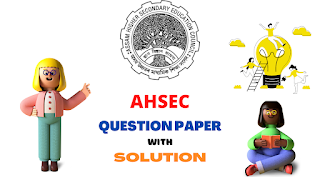ASSEB| CLASS 12| POLITCAL SCIENCE| SOLVED PAPER - 2025| H.S. 2ND YEAR
2025
POLITICAL SCIENCE
Full Marks: 80
(Part-A = 40 + Part-B = 40)
Pass Marks: 24
Time: Three hours
The figures in the margin indicate
full marks for the questions.
PART-A
(Contemporary
World Politics)
1. Answer any six from the following questions: 1x6=6
(a) India is
a member state of ASEAN. (Write Yes/ No)
(b) Who can
exercise the ‘veto’ power in the Security Council?
Ans:- The
five permanent members of the United Nations Security Council—China, France,
Russia, the United Kingdom, and the United States—can exercise the veto power.
(c) Which
State is the successor of the Soviet Union?
Ans:- Russia
is considered to be the only continuing state and successor of the entire
Soviet Union.
(d) Which
country is regarded as the third alternative centre of world power?
Ans:- China.
(e) Write the
full form of SAFTA.
Ans:- South Asian Free Trade Area.
(f) Which day
is celebrated as United Nations’ day?
Ans:- 24 October.
(g) Write ‘Yes’ or ‘No’:
Technology is
an important phenomenon of globalisation.
(h) What is
Greenhouse gas?
Ans:- Greenhouse
gases are atmospheric gases such as carbon dioxide, methane, and nitrous oxide
that trap heat in the Earth's atmosphere, contributing to global warming.
(i) In which
year India successfully tested its first nuclear bomb?
Ans:- May 18, 1974.
(j) What is
the full form of WTO?
Ans:- World Trade Organization.
2. Answer any five from the following questions: 2x5=10
(a) Write the
theory of UN which defines the indigenous people.
Ans:- The
United Nations has no official definition of "indigenous peoples".
Instead, the UN has developed a modern understanding based on several
criteria:-
(i)
Self-identification as indigenous at the individual level and acceptance by the
community.
(ii) Historical
continuity with pre-colonial or pre-settler societies.
(iii) Strong
ties to territories and natural resources.
(iv) Distinctive
social, economic or political system.
(v) Distinctive
language, culture and beliefs.
(vi)
Non-dominant group in society.
(vii) A
determination to maintain and reproduce the environments and systems of their
ancestors as distinct peoples and communities.
The UN
emphasises identity rather than strict definition, with self-identification
being a fundamental criterion.
Or
Write short
note on: Sacred groves in India.
Ans:-
Sacred groves in India are forest areas protected by local communities because
of their religious significance. These groves are traditionally considered the
abode of the gods and are the site of rituals and festivals. Activities such as
hunting and logging are usually strictly prohibited, helping to preserve rare
flora and fauna. There are about 14,000 sacred groves across India, although
the actual number may be much higher. They play an important role in
biodiversity conservation and cultural heritage.
(b) Mention
any two countries in South of India who are the members of SAARC.
Ans:- Two
countries located south of India that are members of SAARC:-
(i) Sri Lanka
(ii) Maldives
(c) Write two
causes of disintegration of Soviet Union.
Ans:- The two
major reasons for the dissolution of the Soviet Union are:-
(i) Economic
weakness: Persistent economic problems, shortages of consumer goods, and
the burden of military and satellite state expenditure led to widespread
discontent.
(ii) Rise of
nationalism: Growing nationalist movements in various republics, especially
the more prosperous ones, led to demands for independence and ultimately to the
dissolution of the USSR.
(d) What is
meant by South Asia?
Ans:-
South Asia is a subregion of Asia that includes the Indo-Gangetic Plain and
peninsular India. It includes the countries of Bangladesh, Bhutan, India,
Pakistan, Nepal, and Sri Lanka; Afghanistan and the Maldives are also often
considered part of South Asia. The term is often synonymous with the
"Indian subcontinent".
(e) Mention
two causes for the failure of stable democracy in Pakistan.
Ans:- Two
reasons for the failure of stable democracy in Pakistan are:-
(i) Dominance
of the military and elite: Frequent military coups and the influence of the
military and landowning elite have undermined elected governments.
(ii) Conflict
with India: Ongoing tensions with India have empowered military and
paramilitary groups, who argue that democracy can threaten national security.
(f) Write the
permanent member nations of Security Council.
Ans:- The
permanent members of the United Nations Security Council are:-
(i) China
(ii) France
(iii) Russia
(iv) United
Kingdom
(v) United
States
3. Answer any three from the following questions: 4x3=12
POLITICAL SCIENCE SOLVED PAPERS PAGE LINK - Click here
BUY E-BOOK (PDF FILE)
[TO SEE FULL SOLUTION]
(Chapter wise Notes, Exam Question Papers solved, MCQ solved) [ARTS, COMMERCE, SCIENCE]
|
DOWNLOAD [PAGE LINK:-CLICK HERE] |
ASSEB, AHSEC PAGE LINK - CLICK HERE

